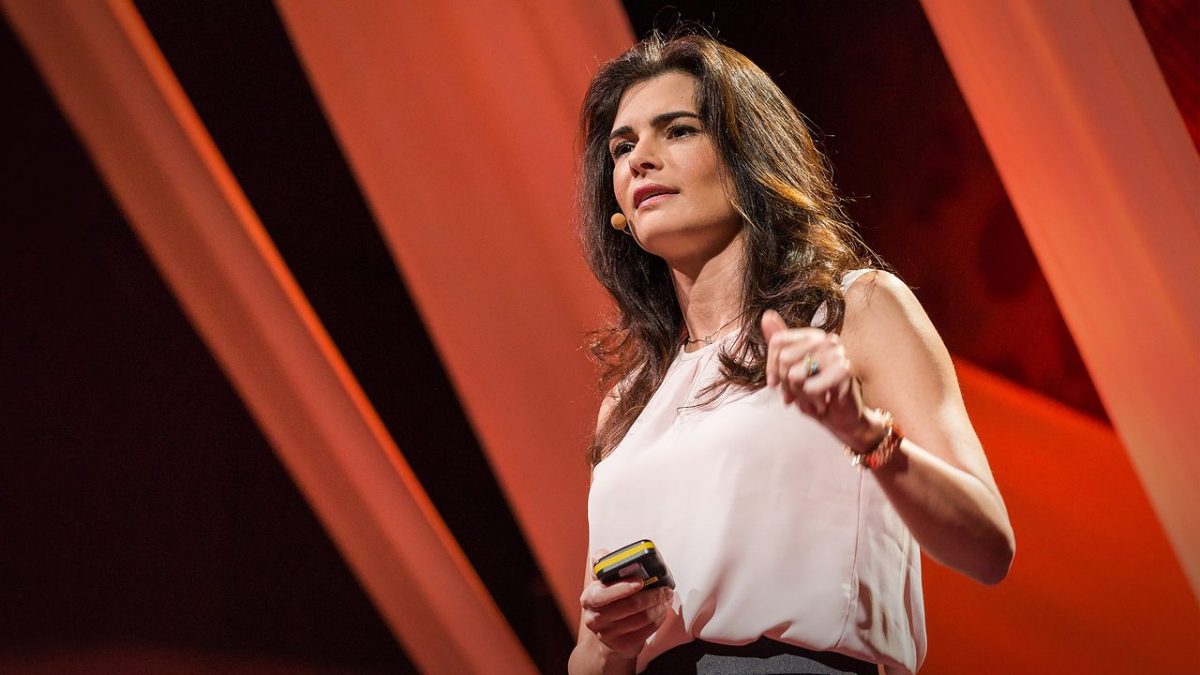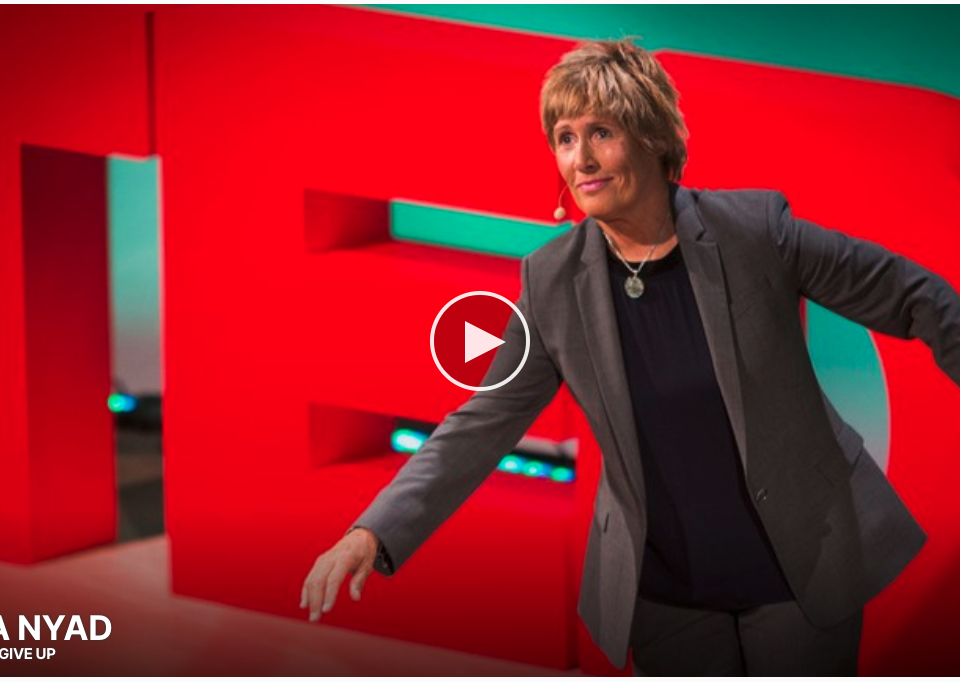
How to build a business that lasts 100 years – Martin Reeves
6 de setembro de 2019
5 ways to kill your dreams – Bel Pesce
20 de setembro de 2019Mom, who are these people?” It was an innocent question from my young daughter Alia around the time when she was three. We were walking along with my husband in one of Abu Dhabi’s big fancy malls. Alia was peering at a huge poster standing tall in the middle of the mall. It featured the three rulers of the United Arab Emirates. As she tucked in my side, I bent down and explained that these were the rulers of the UAE who had worked hard to develop their nation and preserve its unity. She asked, “Mom, why is it that here where we live, and back in Lebanon, where grandma and grandpa live, we never see the pictures of powerful women on the walls? Is it because women are not important?”
This is probably the hardest question I’ve had to answer in my years as a parent and in my 16-plus years of professional life, for that matter. I had grown up in my hometown in Lebanon, the younger of two daughters to a very hard-working pilot and director of operations for the Lebanese Airlines and a super-supportive stay-at-home mom and grandma. My father had encouraged my sister and I to pursue our education even though our culture emphasized at the time that it was sons and not daughters who should be professionally motivated. I was one of very few girls of my generation who left home at 18 to study abroad. My father didn’t have a son, and so I, in a sense, became his.
Fast-forward a couple of decades, and I hope I didn’t do too badly in making my father proud of his would-be son. As I got my Bachelor’s and PhD in electrical engineering, did R&D in the UK, then consulting in the Middle East, I have always been in male-dominated environments. Truth be told, I have never found a role model I could truly identify with. My mother’s generation wasn’t into professional leadership. There were some encouraging men along the way, but none knew the demands and pressures I was facing, pressures that got particularly acute when I had my own two beautiful children. And although Western women love to give us poor, oppressed Arab women advice,they live different lives with different constraints.
So Arab women of my generation have had to become our own role models. We have had to juggle more than Arab men, and we have had to face more cultural rigidity than Western women. As a result, I would like to think that we poor, oppressed women actually have some useful, certainly hard-earned lessons to share, lessons that might turn out useful for anyone wishing to thrive in the modern world.Here are three of mine.
[“Convert their sh*t into your fuel.”]
There is this word that everybody is touting as the key to success: resilience. Well, what exactly is resilience, and how do you develop it? I believe resilience is simply the ability to transform shit into fuel.
In my previous job, well before my current firm, I was working with a man we will call John. I had teamed up with John and was working hard, hoping he would notice how great I was and that he would come to support my case to make partner at the firm. I was, in addition to delivering on my consulting projects, writing passionately on the topic of women economic empowerment. One day, I got to present my research to a roomful of MBA students. John was part of the audience listening for the first time to the details of my study. As I proceeded with my presentation, I could see John in the corner of my eye. He had turned a dark shade of pink and had slid under his chair in apparent shame.
I finished my presentation to an applauding audience and we rushed out and jumped into the car.There he exploded. “What you did up there was unacceptable! You are a consultant, not an activist!” I said, “John, I don’t understand. I presented a couple of gender parity indices, and some conclusions about the Arab world. Yes, we do happen to be today at the bottom of the index, but what is it that I said or presented that was not factual?”
To which he replied, “The whole premise of your study is wrong. What you are doing is dangerous and will break the social fabric of our society.” He paused, then added, “When women have children, their place is in the home.”
Time stood still for a long while, and all I could think and repeat in the chaos of my brain was: “You can forget about that partnership, Leila. It’s just never going to happen.” It took me a couple of days to fully absorb this incident and its implications, but once I did, I reached three conclusions. One, that these were his issues, his complexes. There may be many like him in our society, but I would never let their issues become mine. Two, that I needed another sponsor, and fast.
I got one, by the way, and boy, was he great. And three, that I would get to show John what women with children can do. I apply this lesson equally well to my personal life. As I have progressed in my career, I have received many words of encouragement, but I have also often been met by women, men and couples who have clearly had an issue with my husband and I having chosen the path of a dual-career couple.
So you get this well-meaning couple who tells you straight out at a family gathering or at a friends gathering, that, come on, you must know you’re not a great mom, given how much you’re investing in your career, right? I would lie if I said these words didn’t hurt. My children are the most precious thing to me, and the thought that I could be failing them in any way is intolerable. But just like I did with John, I quickly reminded myself that these were their issues, their complexes. So instead of replying, I gave back one of my largest smiles as I saw, in flashing light, the following sign in my mind’s eye.
[Be happy, it drives people crazy.]
You see, as a young woman in these situations, you have two options. You can either decide to internalize these negative messages that are being thrown at you, to let them make you feel like a failure, like success is way too hard to ever achieve, or you can choose to see that others’ negativity is their own issue, and instead transform it into your own personal fuel. I have learned to always go for option two, and I have found that it has taken me from strength to strength. And it’s true what they say: success is the best revenge.
Some women in the Middle East are lucky enough to be married to someone supportive of their career. Correction: I should say “smart enough,” because who you marry is your own choice, and you’d better marry someone supportive if you plan to have a long career. Still today, the Arab man is not an equal contributor in the home. It’s simply not expected by our society, and even frowned upon as not very manly. As for the Arab woman, our society still assumes that her primary source of happiness should be the happiness and prosperity of her children and husband. She mostly exists for her family. Things are changing, but it will take time.
For now, it means that the professional Arab woman has to somehow maintain the perfect home,make sure that her children’s every need is being taken care of and manage her demanding career. To achieve this, I have found the hard way that you need to apply your hard-earned professional skills to your personal life. You need to work your life.
Here is how I do this in my personal life. One thing to know about the Middle East is that nearly every family has access to affordable domestic help. The challenge therefore becomes how to recruit effectively. Just like I would in my business life, I have based the selection of who would support me with my children while I’m at work on a strong referral. Cristina had worked for four years with my sister and the quality of her work was well-established. She is now an integral member of our family,having been with us since Alia was six months old. She makes sure that the house is running smoothly while I’m at work, and I make sure to empower her in the most optimal conditions for her and my children, just like I would my best talent at work. This lesson applies whatever your childcare situation, whether an au pair, nursery, part-time nanny that you share with someone else. Choose very carefully, and empower.
If you look at my calendar, you will see every working day one and a half hours from 7pm to 8:30pm UAE time blocked and called “family time.” This is sacred time. I have done this ever since Alia was a baby. I do everything in my power to protect this time so that I can be home by then to spend quality time with my children, asking them about their day, checking up on homework, reading them a bedtime story and giving them lots of kisses and cuddles. If I’m traveling, in whatever the time zone, I use Skype to connect with my children even if I am miles away. Our son Burhan is five years old, and he’s learning to read and do basic maths.
Here’s another confession: I have found that our daughter is actually more successful at teaching him these skills than I am.
It started as a game, but Alia loves playing teacher to her little brother, and I have found that these sessions actually improve Burhan’s literacy, increase Alia’s sense of responsibility, and strengthen the bonding between them, a win-win all around.
The successful Arab women I know have each found their unique approach to working their life as they continue to shoulder the lion’s share of responsibility in the home.
But this is not just about surviving in your dual role as a career woman and mother. This is also about being in the present. When I am with my children, I try to leave work out of our lives. Instead of worrying about how many minutes I can spend with them every day, I focus on turning these minutes into memorable moments, moments where I’m seeing my kids, hearing them, connecting with them.
[“Join forces, don’t compete.”]
Arab women of my generation have not been very visible in the public eye as they grew up. This explains, I think, to some extent, why you find so few women in politics in the Arab world. The upside of this, however, is that we have spent a lot of time developing a social skill behind the scenes, in coffee shops, in living rooms, on the phone, a social skill that is very important to success:networking. I would say the average Arab woman has a large network of friends and acquaintances.The majority of those are also women.
In the West, it seems like ambitious women often compare themselves to other women hoping to be noticed as the most successful woman in the room. This leads to the much-spoken-about competitive behavior between professional women. If there’s only room for one woman at the top,then you can’t make room for others, much less lift them up.
Arab women, generally speaking, have not fallen for this psychological trap. Faced with a patriarchal society, they have found that by helping each other out, all benefit.
In my previous job, I was the most senior woman in the Middle East, so one could think that investing in my network of female colleagues couldn’t bring many benefits and that I should instead invest my time developing my relationships with male seniors and peers. Yet two of my biggest breaks came through the support of other women. It was the head of marketing who initially suggested I be considered as a young global leader to the World Economic Forum. She was familiar with my media engagements and my publications, and when she was asked to voice her opinion, she highlighted my name. It was a young consultant, a Saudi lady and friend, who helped me sell my first project in Saudi Arabia, a market I was finding hard to gain traction in as a woman. She introduced me to a client, and that introduction led to the first of very many projects for me in Saudi. Today, I have two senior women on my team, and I see making them successful as key to my own success. Women continue to advance in the world, not fast enough, but we’re moving.
The Arab world, too, is making progress, despite many recent setbacks. Just this year, the UAE appointed five new female ministers to its cabinet, for a total of eight female ministers. That’s nearly 28 percent of the cabinet, and more than many developed countries can claim. This is today my daughter Alia’s favorite picture. This is the result, no doubt, of great leadership, but it is also the result of strong Arab women not giving up and continuously pushing the boundaries. It is the result of Arab women deciding every day like me to convert shit into fuel, to work their life to keep work out of their life, and to join forces and not compete.
As I look to the future, my hopes for my daughter when she stands on this stage some 20, 30 years from now are that she be as proud to call herself her mother’s daughter as her father’s daughter.
My hopes for my son are that by then, the expression “her mother’s son” or “mama’s boy” would have taken on a completely different meaning.
Thank you.
Texto em Português:
Mãe, quem são essas pessoas?” Foi uma pergunta inocente da minha filha pequena Alia, quando tinha três anos. Estávamos passeando com meu marido num dos imensos e requintados shoppings de Abu Dhabi. Alia tinha visto um pôster enorme dependurado no meio do shopping. Ele mostrava os três governantes dos Emirados Árabes Unidos, EAU. Quando ela veio pro meu lado, me abaixei e expliquei que eram os governantes dos EAU que trabalharam duro para desenvolver suas nações e preservar sua unidade. Ela perguntou, “Mãe, por que aqui onde vivemos, e no Líbano, onde a vovó e o vovô vivem, nunca vemos fotos de mulheres poderosas nas paredes? É porque as mulheres não são importantes?”
Provavelmente foi a pergunta mais difícil que tive de responder como mãe e nos meus mais de 16 anos de carreira. Cresci na minha cidade natal no Líbano, a caçula de duas filhas de um piloto e diretor de operações das Linhas Aéreas Libanesas muito trabalhador, e de uma mãe e avó donas de casa que nos davam muito apoio. Meu pai incentivou a mim e minha irmã a estudar, ainda que, na época, nossa cultura enfatizar que os filhos, e não as filhas, é que deveriam ser incentivados profissionalmente. Fui uma das poucas jovens da minha geração a sair de casa aos 18 anos para estudar no exterior. Meu pai não tinha um filho, então, de certa forma, eu me tornei esse filho.
Passadas algumas décadas, espero ter me saído bem em deixar meu pai orgulhoso desse “filho”.Como fiz meu bacharelado e PhD em engenharia elétrica, pesquisa e desenvolvimento no Reino Unido e consultoria no Oriente Médio, sempre circulei em ambientes dominados por homens.Verdade seja dita, nunca encontrei um modelo com quem me identificasse. A geração da minha mãe não buscava liderança profissional. Houve alguns homens que me apoiaram no caminho, mas nenhum sabia as demandas e pressões que eu estava enfrentando, as quais ficaram particularmente maiores quando tive minhas duas belas crianças. Embora as mulheres ocidentais amem nos aconselhar, pobres e oprimidas mulheres árabes, elas vivem vidas diferentes, com limitações diferentes.
Assim, as mulheres árabes da minha geração tiveram de se tornar seu próprio modelo. Tivemos de ter mais jogo de cintura do que os homens árabes e enfrentar mais rigidez cultural do que as mulheres ocidentais. Como resultado, penso que nós, pobres mulheres oprimidas, temos algumas lições úteis, arduamente aprendidas, para compartilhar, lições que talvez sejam úteis para qualquer um que queira prosperar no mundo moderno. Eis as minhas três lições.
[“Transforme a merda alheia em seu combustível”]
Hoje em dia, alardeiam uma palavra como o segredo do sucesso: resiliência. Mas o que é exatamente resiliência, e como a desenvolvemos? Acredito que resiliência seja simplesmente a habilidade de transformar merda em combustível.
No meu emprego anterior, bem antes do meu atual, trabalhei com um homem que vou chamar de John. Eu era da equipe do John e estava trabalhando duro, esperando que ele notasse como eu era boa e me apoiasse para eu me tornar sócia da firma. Além do meu trabalho de consultoria, eu estava escrevendo apaixonadamente sobre o empoderamento econômico das mulheres. Um dia, apresentei minha pesquisa para uma sala cheia de alunos de MBA. e John estava na plateia, ouvindo pela primeira vez os detalhes do meu estudo. Enquanto seguia com minha apresentação, conseguia ver John pelo canto do olho. Ele estava todo vermelho e havia deslizado na cadeira, aparentemente envergonhado.
Terminei minha apresentação sob aplausos, e corremos e entramos no carro. Ali ele explodiu: “O que você fez lá foi inaceitável! Você é uma consultora, não uma ativista!” Eu falei: “John, não estou entendendo. Eu apresentei alguns índices de paridade de gênero, e algumas conclusões sobre o mundo árabe. Sim, acontece de hoje nós estarmos no final dos indicadores, mas o que foi que eu disse ou apresentei que não seja fato?”
E ele respondeu: “Toda a premissa do seu estudo está errada. O que está fazendo é perigoso e vai romper o tecido social de nossa sociedade”. Ele parou, depois completou: “Quando a mulher tem filhos, seu lugar é em casa”.
O tempo parou por um longo momento, e tudo o que conseguia pensar e repetir em meio ao caos do meu cérebro era: “Pode esquecer sobre a sociedade, Leila. Simplesmente nunca vai acontecer”.Levei alguns dias para absorver por completo o incidente e suas implicações, mas, quando consegui, cheguei a três conclusões. Primeiro, que esses eram problemas dele, complexos dele. Deve haver muitos como ele em nossa sociedade, mas eu nunca permitiria que seus problemas se tornassem meus. Segundo, que eu precisava de outro patrocinador, e rápido.
Por sinal, arrumei outro, e ele era ótimo. Terceiro, que eu teria de mostrar a John o que mulheres com filhos podem fazer. Uso essa mesma lição na minha vida pessoal também. À medida que progredi na carreira, recebi muitas palavras de encorajamento, mas muitas vezes também conheci mulheres, homens e casais que claramente tinham um problema com o fato de meu marido e eu ambos termos escolhido seguir carreiras profissionais.
Sempre havia um casal bem-intencionado me dizendo diretamente numa reunião de família, ou num encontro de amigos: “Pois é, você sabe que não é uma ótima mãe considerando o quanto você investe na sua carreira, não sabe?” Seria mentira dizer que essas palavras não magoavam. Meus filhos são o que há de mais precioso para mim, e a ideia de que poderia estar falhando com eles de alguma forma é intolerável. Mas, assim como fiz com John, rapidamente lembrei a mim mesma que essas eram questões deles, complexos deles. Então, em vez de replicar, eu abria um sorriso bem largo enquanto via, em luzes cintilantes, o seguinte aviso na minha mente:
[Seja feliz: isso deixa as pessoas loucas da vida.]
Vejam bem, uma mulher jovem numa situação dessa tem duas opções. Pode escolher internalizar essas mensagens negativas jogadas nela, e permitir que elas a façam se sentir um fracasso, como se o sucesso fosse difícil demais de se alcançar, ou decidir enxergar que a negatividade alheia é um problema deles, e transformá-la em seu próprio combustível pessoal. Aprendi a escolher sempre a segunda opção, e venho descobrindo que isso tem me levado de um êxito a outro. E é verdade o que dizem: o sucesso é a melhor vingança.
Algumas mulheres no Oriente Médio têm a sorte de se casarem com alguém que apoie sua carreira.Corrigindo, eu devia dizer que têm a “inteligência”, porque com quem você se casa é escolha sua, e é melhor se casar com alguém que a apoie, se planeja ter uma longa carreira. Ainda hoje, o homem árabe não colabora igualitariamente nas tarefas de casa. Isso é algo não só esperado em nossa sociedade, mas criticado, por não ser muito masculino. No que se refere à mulher árabe, no entanto, presume-se que sua fonte primária de felicidade esteja na felicidade e prosperidade dos filhos e do marido. Ela praticamente existe para sua família. As coisas estão mudando, mas ainda levará algum tempo.
Hoje, isso significa que a mulher árabe profissional precisa, de alguma forma, manter a casa impecável, garantir que todas as necessidades dos filhos sejam atendidas e administrar as exigências duma carreira. Para conseguir isso, descobri, do jeito mais difícil, que é preciso aplicar na vida pessoal as habilidades duramente conquistadas na vida profissional. É preciso administrar sua vida.
Eis como administro minha vida pessoal. [Administração de talento]. Uma coisa sobre o Oriente Médio é que praticamente todas as famílias têm acesso à ajuda doméstica. O desafio, então, é como recrutar de uma maneira eficiente. Assim como faria na minha vida profissional, baseio a seleção de quem vai me ajudar com os filhos enquanto estou trabalhando em fortes indicadores. A Cristina trabalhou quatro anos com a minha irmã, e a qualidade de seu trabalho já era conhecida. Agora ela é um membro integral de nossa família, e está conosco desde que a Alia tinha seis meses. Ela assegura que tudo corra bem em casa enquanto estou no trabalho, e faço questão de empoderá-la com as melhores condições para ela e meus filhos, assim como eu faria no trabalho com um funcionário talentoso. Essa lição se aplica a seja lá quem cuide dos seus filhos, seja uma babá, uma creche, uma babá de meio período. Selecione cuidadosamente e empodere.
Se pegarem minha agenda, vão ver que todos os dias úteis, por uma hora e meia, das 19h às 20h30, no horário dos EAU, está reservado: “tempo para a família”. Essa hora e meia é sagrada. Faço isso desde que a Alia era um bebê. [Administração do tempo] Faço tudo que posso para preservar esse horário, para poder estar em casa e ter um tempo de qualidade com meus filhos, perguntando sobre seu dia, olhando o dever de casa, lendo uma história antes de dormir e dando neles muitos beijos e carinho. Se estou viajando, seja qual for o fuso horário, uso o Skype para falar com eles, mesmo a quilômetros de distância. [Tire partido da tecnologia} Nosso filho Burhan tem cinco anos, e está aprendendo a ler e os fundamentos da matemática.
Aqui vai outra confissão: descobri que nossa filha é melhor para ensinar a ele do que eu. [Aprenda a delegar]
Começou como um jogo, mas Alia ama brincar de professora de seu irmãozinho, e descobri que essas sessões de fato melhoraram a alfabetização de Burhan, aumentaram o senso de responsabilidade da Alia, e fortaleceram o laço entre os dois. Todos saímos ganhando.
As mulheres árabes de sucesso que conheço encontraram, cada uma, uma forma de gerenciar sua vida enquanto continuam a assumir sua parte nas responsabilidades da casa.
Mas isso não tem a ver só com dar conta dos papéis de profissional e mãe. Tem a ver também com estar no presente. Quando estou com meus filhos, tento deixar o trabalho fora da nossa vida. Em vez me preocupar com quantos minutos posso passar com eles todos os dias, foco em tornar esses minutos momentos memoráveis, momentos em que estou vendo meus filhos, ouvindo-os, me conectando com eles.
[“Una esforços em vez de competir”]
As mulheres árabes da minha geração não eram muito visíveis aos olhares públicos enquanto cresciam. Isso explica, penso eu, de certo modo, por que há tão poucas mulheres na política no mundo árabe. A vantagem disso, no entanto, é que passamos muito tempo desenvolvendo nossas habilidades sociais nos bastidores, nos cafés, nas salas de estar, ao telefone, habilidades sociais muito importantes para o sucesso: criando uma rede de contatos. Eu diria que a mulher árabe comum tem uma grande quantidade de amigos e conhecidos. A maioria deles também mulheres.
No Ocidente, parece que as mulheres ambiciosas frequentemente se comparam às outras esperando ser notadas como a mais bem-sucedida do grupo. Isto leva ao muito falado comportamento competitivo entre as mulheres profissionais. Se houver espaço para apenas uma mulher no topo,então você não pode abrir espaço para as outras, muito menos apoiá-las.
As mulheres árabes, de forma geral, não sucumbiram a essa armadilha psicológica. Expostas a uma sociedade patriarcal, elas descobriram que, ao ajudar umas às outras, todas se beneficiam.
No emprego anterior, eu era a mulher de cargo mais alto no Oriente Médio, então era de se esperar que investir na minha rede de contatos de mulheres não poderia trazer muitos benefícios, que eu deveria, então, investir meu tempo desenvolvendo meu relacionamento com os chefes e colegas homens. Mesmo assim, dois dos meus maiores saltos vieram do apoio de outras mulheres. Foi a gerente de marketing que inicialmente sugeriu eu ser considerada uma jovem líder global no Fórum Econômico Mundial. Ela conhecia meu trabalho na mídia e minhas publicações e, quando pediram sua opinião, ela destacou meu nome. E foi uma jovem amiga saudita quem me ajudou a vender meu primeiro projeto na Arábia Saudita, um mercado difícil de se abrir para uma mulher. Ela me apresentou a um cliente, e aquilo me levou ao primeiro de muitos projetos na Arábia Saudita. Hoje, tenho duas mulheres seniores na minha equipe, e promover o sucesso delas é o segredo para meu próprio sucesso. As mulheres continuam a avançar no mundo, não rápido o bastante, mas estamos nos movendo.
O mundo árabe, também, está progredindo, apesar dos muitos reveses recentes. Só este ano, os EAU nomearam cinco novas mulheres ministras para o seu gabinete, num total de oito mulheres ministras. Isso é quase 28% do gabinete, é mais do que muitos países desenvolvidos podem ostentar. Hoje em dia , esta é a foto favorita da minha filha Alia. Isso é, sem dúvida, o resultado de uma grande liderança, mas também é o resultado de mulheres árabes fortes que não desistem e continuamente ultrapassam os limites. É o resultado de mulheres árabes escolhendo todos os dias, como eu, transformar merda em combustível, lutando para manter o trabalho fora da vida pessoal e unindo forças em vez de competir.
Quando olho para o futuro, espero que minha filha, quando ela estiver neste palco daqui a 20 ou 30 anos, que tenha orgulho de ser a princesa da mamãe, tanto quanto a do papai.
Quanto ao meu filho, espero que, no futuro, a expressão “filhinho da mamãe” ou similar seja interpretada de uma forma bem diferente.
Obrigada.





